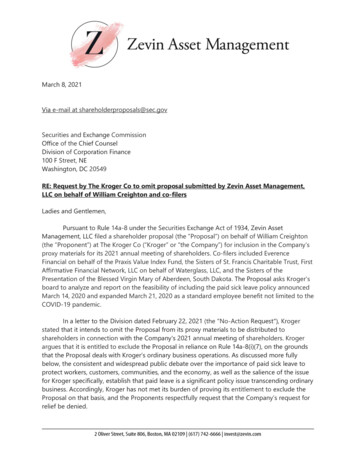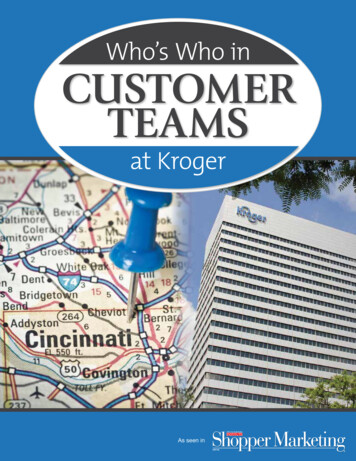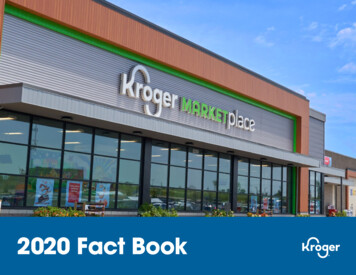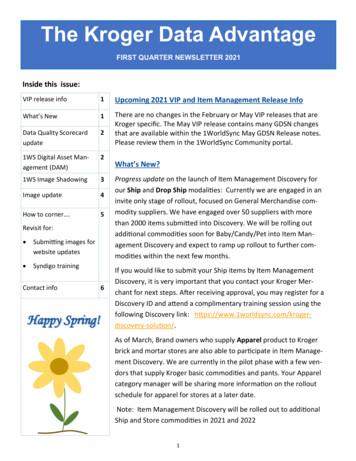
Transcription
March 8, 2021Via e-mail at shareholderproposals@sec.govSecurities and Exchange CommissionOffice of the Chief CounselDivision of Corporation Finance100 F Street, NEWashington, DC 20549RE: Request by The Kroger Co to omit proposal submitted by Zevin Asset Management,LLC on behalf of William Creighton and co-filersLadies and Gentlemen,Pursuant to Rule 14a-8 under the Securities Exchange Act of 1934, Zevin AssetManagement, LLC filed a shareholder proposal (the “Proposal”) on behalf of William Creighton(the “Proponent”) at The Kroger Co (“Kroger” or “the Company”) for inclusion in the Company’sproxy materials for its 2021 annual meeting of shareholders. Co-filers included EverenceFinancial on behalf of the Praxis Value Index Fund, the Sisters of St. Francis Charitable Trust, FirstAffirmative Financial Network, LLC on behalf of Waterglass, LLC, and the Sisters of thePresentation of the Blessed Virgin Mary of Aberdeen, South Dakota. The Proposal asks Kroger’sboard to analyze and report on the feasibility of including the paid sick leave policy announcedMarch 14, 2020 and expanded March 21, 2020 as a standard employee benefit not limited to theCOVID-19 pandemic.In a letter to the Division dated February 22, 2021 (the "No-Action Request"), Krogerstated that it intends to omit the Proposal from its proxy materials to be distributed toshareholders in connection with the Company's 2021 annual meeting of shareholders. Krogerargues that it is entitled to exclude the Proposal in reliance on Rule 14a-8(i)(7), on the groundsthat the Proposal deals with Kroger’s ordinary business operations. As discussed more fullybelow, the consistent and widespread public debate over the importance of paid sick leave toprotect workers, customers, communities, and the economy, as well as the salience of the issuefor Kroger specifically, establish that paid leave is a significant policy issue transcending ordinarybusiness. Accordingly, Kroger has not met its burden of proving its entitlement to exclude theProposal on that basis, and the Proponents respectfully request that the Company’s request forrelief be denied.
Zevin Asset Management, LLCResponse to Kroger No-Action RequestMarch 8, 2021Page 2The ProposalThe Proposal states:RESOLVED, that shareholders of Kroger ask the board of directors to analyze and report onthe feasibility of including the paid sick leave policy1 announced March 14, 2020 andexpanded March 21, 2020 as a standard employee benefit not limited to the COVID-19pandemic.Ordinary BusinessRule 14a-8(i)(7) allows exclusion of proposals related to a company’s ordinary businessoperations. Kroger argues that the Proposal relates to the Company’s ordinary businessoperations because it addresses general employee compensation and benefits, as well asmanagement of the workforce, without implicating a significant policy issue. The Companyfurther argues that the Proposal seeks to micromanage the Company.The Proponents do not dispute that proposals on general employeecompensation/benefits and workforce management, without more, deal with ordinary businessoperations. But companies are generally not allowed to rely on the ordinary business exclusionto omit such proposals if they “focus[] on sufficiently significant social policy issues.”2Paid Sick Leave is a Consistent Subject of Widespread Public DebateOver the past eight years, paid sick leave has been the consistent subject of widespreadpublic debate, the Division’s standard for a significant policy issue.3 This growing public concernand policy activity was greatly amplified in 2020 and 2021 with the COVID-19 pandemic. TheProponents respectfully submit that the 2019 determination in Walmart, Inc.,4 on which Krogerrelies,5 should be revisited in light of these changed circumstances.Well before the pandemic, concerns were raised about workers who must work while sickbecause they can’t afford to miss a shift or fear disciplinary consequences. Between 2012 and2019, 11 states and the District of Columbia adopted measures to require paid sick leave.6 es/default.aspx2 Exchange Act Release No. 40018 (May 21, 1998) (the “1998 Release”).3 See, e.g., https://www.sec.gov/interps/legal/cfslb14a.htm4 Walmart, Inc. (avail. Apr. 8, 2019).5 No-Action Request, at 8.6 ; see ment/paid-sick-leave.aspx. Examples of coverage of paid sick leave1
Zevin Asset Management, LLCResponse to Kroger No-Action RequestMarch 8, 2021Page 3municipalities, including Los Angeles, Chicago, and New York City, had such requirements as ofMarch 2020.7President Obama signed an Executive Order in 2015 directing the Department of Laborto promulgate rules requiring federal contractors to give employees seven days of paid sickleave.8 Discussing those rules, President Obama explained, “Coming to work sick is bad foremployees, co-workers, and customers alike.”9 He highlighted the issue in his 2016 State of theUnion address, stating, “Equal pay for equal work, paid leave and raising the minimum wage. Allof these things still matter to working families, they are the right thing to do, and I won't stopuntil they get done."10President Obama also urged Congress to “pass a law guaranteeing most workers inAmerica the chance to earn seven days of paid sick leave each year.”11 The Healthy Families Act(“HFA”) was introduced by Rep. Rosa DeLauro and Sen. Patty Murray in 2017 and again in2019.12 The HFA would require employers with 15 or more employees to allow each employee to“permit each employee to earn at least 1 hour of paid sick time for every 30 hours worked.”13The National Paid Sick Days Coalition formed to promote national legislation providing paid sickleave. That coalition is made up of hundreds of organizations, including women’s and children’sorganizations, labor groups, religious organizations and think tanks.24 The HFA has been thecoalition’s primary national focus.14The FAMILY Act would establish an Office of Paid Family and Medical Leave within theSocial Security Administration to administer a family and medical leave insurance benefit fundedby a federal Family Leave and Medical Insurance Trust Fund. The benefit would be payable toworkers who are dealing with their own medical needs or those of relatives. In the Senate, theFAMILY Act was introduced by Sen. Kirsten Gillibrand in 2017 and 2019 and co-sponsored bySens. Elizabeth Warren, Bernie Sanders, Amy Klobuchar, Kamala Harris and Cory Booker.15 TheHouse version of the bill was introduced by Rep. Rosa DeLauro in 2017 and 2019, and the 2019bill had 219 co-sponsors.16requirements adopted prior to the pandemic can be found at id-sick-leave-for-workers/; -leave-benefits-for-new-yorkers7 See 8 cts/sick-leave9 kleave.html10 aid-sick-leave-listen-to-obama.html11 to-act-on-paid-sick-leave/12 See e-bill/636; -bill/84013 e-bill/84014 http://www.paidsickdays.org/campaigns/15 e-bill/463/text16 -bill/1185
Zevin Asset Management, LLCResponse to Kroger No-Action RequestMarch 8, 2021Page 4The pandemic threw into stark relief the relationship between paid sick leave, publichealth, and the precarity of many workers’ finances. As Americans negotiate safely shopping andtaking public or for-hire transportation, and amid concerns over outbreaks at meat packingplants and nursing homes, attention has focused on whether workers at essential businesseshave the protections they need to keep customers and communities safe. The media hascovered the issue extensively. An article at the very beginning of the pandemic predicted thatpoor sick leave coverage in the U.S. “might prove to be among the biggest Achilles’ heels inefforts to stymie the spread of COVID-19.”17Examples of coverage in national publications include numerous articles and opinionpieces in The New York Times,18 Washington Post, 19 Atlantic Monthly,20 and USA peciallyhard/607213/18 E.g., ers.html19 E.g., bee4aff story.html; b35965a-5d51-11ea-9055-5fa12981bbbf /2020/11/23/retail-workers-pandemic-pay/20 E.g., inter/616204/21 E.g., ght-now/111535588/; navirus-fight-needs-paid-sick-leave17
Zevin Asset Management, LLCResponse to Kroger No-Action RequestMarch 8, 2021Page 5The proliferation of public policy initiatives addressing paid sick and caregiving leaveevidence the vigor of public debate on the issue: The Families First Coronavirus Response Act, which required employers with fewer than500 employees to provide paid sick and caregiving leave, was introduced and becamelaw in March.22 In May, the House passed the HEROES Act, which would have broadened the workerscovered by the FFCRA’s paid leave provisions and extended them through 2021.23 New York state passed the Quarantine Leave Law in March, which required thatemployers with more than 10 employees provide paid sick leave to an employee unableto work due to “a mandatory or precautionary order of quarantine or isolation due toCOVID-19.”24 New York state enacted a paid sick leave law in April which took effect on September30th.25 The California Governor signed an executive order in April requiring that workers in thefood sector, including independent contractors and gig workers, receive two weeks ofpaid sick leave.26 Pursuant to the Colorado Governor’s March 10th State of Disaster Emergencydeclaration, the state’s Department of Labor and Employment issued emergencyregulations requiring paid sick leave for some workers.27 Six California cities, including Long Beach, Los Angeles, San Francisco, and Oakland,passed emergency paid sick leave ordinances in the spring.28 Pittsburgh enacted an emergency paid sick leave law to supplement existing protectionsfor the duration of the city’s emergency declaration.29 Philadelphia expanded existing sick leave protections to cover gig workers inSeptember.30editorials-debates/5013280002/; a-report-for-america/3930065001/; 02/; egnant-bonuses/2884869001/22 -bill/620123 -bill/680024 s-new-quarantine-leave-law-025 ave26 lifornia-provides-paid-sick-leave-for-food27 aid28 ng-beachcalifornia29 posal/30 k-leave-philadelphia-gig-workers-20200910.html (“[T]hepandemic shined a light on how many workers were lacking such safeguards as paid sick leave or whistle-blowerprotection.”).
Zevin Asset Management, LLCResponse to Kroger No-Action RequestMarch 8, 2021Page 6 In February 2021, the New Mexico House of Representatives passed a bill that wouldrequire many employers to increase the amount of paid sick leave that workers can earnin a given year.31Also in February 2021, the Virginia House of Delegates passed a bill that wouldguarantee paid sick leave to “essential workers,” including those working in “essentialretail business.”32The paid sick leave provisions of the FFCRA were not part of the late 2020 COVID reliefpackage, so they expired at the end of 2020, igniting additional media coverage of the issue andfurther elevating the importance of company-provided protections:33 id-sick-leave-ends-coronavirusmcconnell d1e-8b94-43db-a52e-c9397671272e bill-1558296 e/ on/35109428# e/ .html 1e-8b94-43db-a52e-c9397671272eMost recently, reviving paid sick leave “to limit the spread of COVID-19 and provideeconomic security to millions of working families” is a key part of President Biden’s ll/article 99ea8da2-7863-11eb-b1c5-e721194a1a9e.html32 for-senatedebate/33 43db-a52e-c9397671272e; bill-1558296; e/; on/35109428#; e/; .html31
Zevin Asset Management, LLCResponse to Kroger No-Action RequestMarch 8, 2021Page 7relief plan, the “American Rescue Plan,” announced on January 14th.34 The American Rescue Planproposed to restore the FFCRA’s requirement that employers with 500 or fewer employeesprovide paid leave (and reimburse them for the expense using a refundable tax credit); extendthe requirement to cover employees of larger employers as well as healthcare workers and firstresponders, who were not covered by the FFCRA; expand caregiving leave; and provide federalworkers with emergency paid leave.35Academic researchers have concluded that paid sick leave curbs transmission of COVID19. An October 2020 study compared the number of COVID-19 cases in states where workersgained paid sick leave as a result of the FFCRA with the number in states where workers alreadyhad such leave and estimated that the FFCRA’s paid sick leave provision resulted in 400 fewercases per day.36 That study was consistent with pre-pandemic research finding that state paidsick leave mandates reduced rates of influenza-like illness by 11% per week in the first year,37and it was cited in the American Rescue Plan.Though the robust debate over paid sick leave described above intensified as a result ofthe COVID-19 pandemic, there is good reason to believe that it will persist even after the currentcrisis has passed. Experts have made clear that COVID-19 is likely a sign of things to come ratherthan a rare event. Writing in August 2020, Dr. Anthony Fauci and Dr. David Morens describedthe “pandemic era” which includes “the threat of ever more frequent and deadly emergences ofinfectious diseases.” As they explained, “[e]vidence suggests that SARS, MERS, and COVID-19 areonly the latest examples of a deadly barrage of coming coronavirus and other emergences.”38The World Health Organization (WHO) warned that “despite the severity, the COVID-19pandemic is not ‘necessarily the big one.’”39 Dr. Mark Ryan, head of the WHO emergenciesprogram, said that the primary takeaway from COVID-19 should be that “we need to get readyfor something which may be more severe in the future.”40The Intergovernmental Science-Policy Platform on Biodiversity and Ecosystem Servicesissued a study in October 2020 which said that “[w]ithout preventative strategies, pandemicswill emerge more often, spread more rapidly, kill more people, and affect the global economySee, e.g., nveils-his-plan-for-paid-leave/;35 debar 0, at 7-8.36 aff.2020.0086337 https://papers.ssrn.com/sol3/papers.cfm?abstract id 366027738 1012-6#bib5839 demic-big-one-who/40 demic-big-one-who/34
Zevin Asset Management, LLCResponse to Kroger No-Action RequestMarch 8, 2021Page 8with more devastating impact than ever before.”41 Gavi, the Vaccine Alliance, has drawn similarconclusions, explaining that pandemic risks are increasing due to greater interconnectedness,urbanization, climate change, increased animal-human contact, and shortages of health workersin places where pandemics tend to start.42As well, the pandemic sparked broader discussion of how “essential workers”—thosewho provide essential products and services like food, medical care, transportation, delivery, lawenforcement, childcare and education—are treated in the U.S. Many such workers are poorlypaid and lack benefits like health insurance and paid sick leave, both of which create publichealth risks by impeding access to health care and discouraging workers from staying homewhen they are sick. Especially relevant for Kroger, in October 2020, CNN reported on a scientificstudy suggesting that “about 20% of grocery workers had COVID-19.”43 The study, which wasbased on a sample of grocery workers in Boston, further found that “[w]orkers had tried to takeprecautions. Nearly all, 91%, said they wore a face mask at work and 77% said they also woremasks outside of work. Yet only about 66% said they were able to practice social distancingconsistently on the job.”44 The pandemic has highlighted our interconnectedness — “If we worksick, then you get sick,” workers chanted at a 2020 protest45 — which increases the likelihoodthat issues like paid sick leave will continue to have a high profile.Paid Sick Leave is a Salient Issue for Kroger, Not Just Society GenerallyKroger seems to dismiss the relevance of the broader societal debate in arguing thatpaid sick leave is not a significant policy issue, urging that “references in the Proposal andSupporting Statement to COVID-19, public health, and the importance of paid sick leave do not,in and of themselves, transform a proposal focused on a particular associate benefit into onethat transcends the Company’s ‘ordinary business’ for purposes of Rule 14a-8(i)(7).”46 Under theDivision’s longstanding approach, however, a proponent must show the existence of widespreadpublic debate on a subject in order to prove that it is a significant policy issue. Moreover, theProponents are not relying solely on “references” in the Proposal, but also on the extensiveevidence of a widespread public debate outlined in the previous section.More recent Division guidance has indicated that a subject must also be significant forthe particular company.47 Although Kroger does not explicitly assert that paid leave is not in%20Text%20Final 0.pdf42 ndemics-like-covid-19-are-becoming-more-likely43 ers-increased-covid-19-risk-wellness/index.html44 Ibid.45 irus-paid-sick-leave.html46 No-Action Request, at 10.47 See Staff Legal Bulletin 14I (Nov. 1, 2017) (“Whether the significant policy exception applies depends, in part, onthe connection between the significant policy issue and the company’s business operations.”); Staff Legal Bulletin 14J41
Zevin Asset Management, LLCResponse to Kroger No-Action RequestMarch 8, 2021Page 9salient issue for it, the Company’s citation to Staff Legal Bulletin 14K suggests that argument.But as the largest supermarket chain in the U.S. and one of the country’s largest employers ofgrocery workers — workers who have been widely designated as “essential workers” who havebeen reporting for work throughout the pandemic — Kroger’s own paid leave policies havemanifested clear public policy consequences, attracted attention, and provoked widespreadpublic debate.Kroger was among the companies prominently mentioned in a New York Times editorialin March 2020 entitled “The Companies Putting Profits Ahead of Public Health,” highlighting thetens of thousands of Kroger employees reportedly lacking access to paid sick leave as astandard benefit,48 and other articles also focused on Kroger.49 Kroger’s approach to sick leavereceived even more direct and pointed attention as the Company’s COVID-19-relatedemergency sick leave policy was set to expire in late 2020. POLITICO noted this risky andimportant issue for Kroger on November 29, 2020, in an article entitled “Millions of workerspoised to lose access to paid leave as virus spikes.” The national news article related specificshortcomings in Kroger’s approach to sick leave, quoting an employee:Janet Wainwright, who works at a Kroger supermarket in Yorktown, Va., said her employerused to provide paid leave to workers who tested positive. Now, employees who contractcoronavirus “have to take 14 days leave with no pay.”“We’re being forced to work because we can’t live without our jobs every day,” she said.“This makes us paranoid and fearful because it makes people more likely to come to worksick.”50The above report demonstrates that, in the view of the national political press, theconduct of sick leave policy at Kroger was quite evidently linked to and reinforcing of specificpublic policy consequences in the United States at large. Indeed, the POLITICO article linkedshortcomings in the sick leave approaches of Kroger and other employers with the current US(Oct. 23, 2018) (“To assist the staff with its review of these types of no-action requests, [SLB 14I] invited companies toinclude in their no-action requests a discussion reflecting the board’s analysis of the particular policy issue raised bythe proposal and its significance in relation to the company.”); Staff Legal Bulletin 14K (Oct. 16, 2019) (“The staff takesa company-specific approach in evaluating significance, rather than recognizing particular issues or categories ofissues as universally ‘significant.’ Accordingly, a policy issue that is significant to one company may not be significantto another.”).48 coronavirus-paid-sick-leave.html49 E.g., ging-jobbias; afet.html;50 of-workers-lose-paid-leave-coronavirus-440793
Zevin Asset Management, LLCResponse to Kroger No-Action RequestMarch 8, 2021Page 10public policy crisis in which “[a]s many as 87 million public and private sector workers could loseaccess to the federally mandated benefit [paid sick leave] at the end of the year.”51Similarly, a USA Today article also from November 2020 highlighted the connectionsbetween lapsed emergency paid sick leave benefits and broader problems in Kroger’s laborrelations. The article, entitled “No masks? No hazard pay? Amid COVID-19 surge, grocery storeworkers demand protections,” surfaced the complaint among members of the United Food andCommercial Workers Union “that many major employers have grown lax, cutting wages andprotections put in place when the coronavirus first began to spread in the spring.” As evidencedby the article, which mentioned Kroger, the fight over whether to restore paid sick leave policiesenacted temporarily and in a limited fashion at the start of the COVID-19 pandemic was drivingsignificant public policy and labor relations controversies.52Kroger’s poor approach to sick leave received so much public attention that aMoveOn.org petition has been launched challenging Kroger to “provide paid sick leave toemployees.” As of March 2021, the petition had more than 87,000 signatures.53The sustained public policy conversation around benefits and human capitalmanagement practices specifically at Kroger has continued in 2021 as the company fightsagainst attempts by community leaders in various jurisdictions to mandate enhanced benefitsfor workers. In February 2021, Kroger announced that it would close two stores in Long Beach,California instead of complying with “a local ordinance requiring extra pay for certain groceryemployees working during the pandemic,” according to a report in USA Today.54 Kroger’sapproach to avoiding hazard pay or “hero pay” ordinances, which included a similar decision inthe Seattle area, received widespread negative coverage in national media outlets.55 A recentop-ed piece in The Los Angeles Times by Robert Garcia, the mayor of Long Beach, California,and Anthony Rendon, the Speaker of the California State Assembly, drew a clear connectionbetween Kroger’s recent decisions and the public policy crisis regarding sick leave, observingthat “[w]orkers who need to quarantine are rapidly exhausting paid sick le
The Proposal asks Kroger's board to analyze and report on the feasibility of including the paid sick leave policy announced March 14, 2020 and expanded March 21, 2020 as a standard employee benefit not limited to the COVID-19 pandemic. In a letter to the Division dated February 22, 2021 (the "No-Action Request"), Kroger










